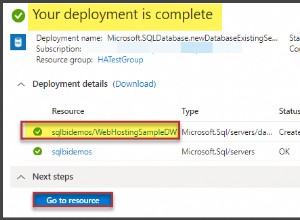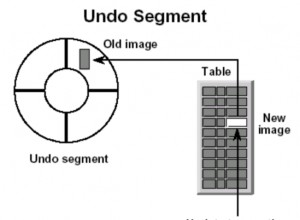Se você não quiser usar a sintaxe fluente, existem três outras maneiras de implementar a referência usando anotações de dados (Pessoalmente, prefiro anotações de dados, pois parecem mais fáceis de ler e são escritas logo acima da propriedade que estão afetando):
1.1) Use ForeignKey (com uma propriedade associada) - versão 1
[Table("WIDGETENTITIES")]
public class WidgetEntity {
[Column("WIDGETENTITY_ID")]
public int Id { get; set; }
[Column("WIDGETSEQUENCE_ID")]
public int WidgetSequenceId { get; set; }
[ForeignKey("WidgetSequenceId")] //Has to be a property name, not table column name
public WidgetSequence Sequence { get; set; }
// and other properties that map correctly
}
[Table("WIDGETSEQUENCES")]
public class WidgetSequence {
[Column("WIDGETSEQUENCE_ID")]
public int Id { get; set; }
[Column("NUMBER")]
public int Number { get; set; }
}
1.2) Use ForeignKey (com uma propriedade associada) - versão 2
[Table("WIDGETENTITIES")]
public class WidgetEntity {
[Column("WIDGETENTITY_ID")]
public int Id { get; set; }
[ForeignKey("Sequence")] //Has to be a property name, not table column name
[Column("WIDGETSEQUENCE_ID")]
public int WidgetSequenceId { get; set; }
public WidgetSequence Sequence { get; set; }
// and other properties that map correctly
}
[Table("WIDGETSEQUENCES")]
public class WidgetSequence {
[Column("WIDGETSEQUENCE_ID")]
public int Id { get; set; }
[Column("NUMBER")]
public int Number { get; set; }
}
2) Você também pode usar o InversePropertyAttribute.
[Table("WIDGETENTITIES")]
public class WidgetEntity {
[Column("WIDGETENTITY_ID")]
public int Id { get; set; }
[InverseProperty("WidgetEntities")]
public WidgetSequence Sequence { get; set; }
// and other properties that map correctly
}
[Table("WIDGETSEQUENCES")]
public class WidgetSequence {
[Column("WIDGETSEQUENCE_ID")]
public int Id { get; set; }
[Column("NUMBER")]
public int Number { get; set; }
public virtual List<WidgetEntity> WidgetEntities { get; set; }
}




